-

新人教版高中英语必修2Unit 3 The Internet-Listening &Speaking&Talking教案一
Listening and Speaking introduces the topic of “ask about online habits”. Many middle school students have been surfing the Internet for many years, but what they do with the Internet and how much time they spend every day may not be very clear to themselves, nor to other students. This section allows students to investigate their peers' Internet use, which is conducive to their mutual understanding and understanding of the Internet. It can also help them reflect on their own online behavior, learn from other people's good online habits, and get rid of their bad online behavior.The listening text of this section is an investigation interview. The investigators interview specific groups with the same questions to obtain information, so as to understand their views, practices or attitudes on this issue. There are two specific questions: “how much time do you spend online every day? What do you usually do online?”. The answers of the three respondents provide rich and different information, and achieve the purpose of the investigators. The oral discourse structure of survey interviews generally includes greeting and explaining the purpose of the interview, presenting the interview questions and the respondents' answers. Listening and Talking introduces the theme of “choosing the right application ". Listening text is a conversation between Laura and Xiao Bo. In this part of listening, “oink”; “piggy bank” may cause the students' hearing comprehension limitation. Oink refers to sound word and pig's sound. So, add some oink to my piggy bank is often used to describe "making a little money".1. Guide students to understand the content of listening texts in terms of listening for definitions.2. Cultivate students' ability to define words and understand an investigation interview.

新人教版高中英语必修2Unit 4 History and Traditions-Discovering Useful Structure教案一
Step 5 Practice一、完成下列句子。1. Judy and I _______________(把车停下来(park))in an underground car Park near Trafalgar Square, where we could ______________________(让我们的车充电(charge)).2. When we finally reached the service desk to ask for audio guides, we heard it ___________ that there were no audio guides____________(留下,剩下).3. We__________________________(发现自己对...很惊讶)the large number of visitors and the amount of noise at the entrance of the National Gallery.4. Judy ____________________(眼神专注于) Van Gogh’s Sunflowers. It was hard to approach the painting as there were so many people around.5. She ____________________(把这幅画的复制品装箱(box)) to ensure that it was delivered safely.答案:1.had our car parked get our car battery charged 2. announced left 3. found ourselves very surprised 4. had her eyes fixed on 5. had a copy of the painting boxed二、用过去分词对下列句子进行改写。1. Loch Ness was surrounded by beautiful natural landscape, which made it look amazing.2. Carl and his friend stayed with a generous family who offered them bread with butter and honey that was homemade.3. The family’s ancestors once attended to soldiers who were wounded in the First World War.4. The young people were attracted by the legend of Loch Ness. They watched over the lake with their cameras and binoculars, which were positioned on the hill.答案:1. Loch Ness surrounded by beautiful natural landscape looks amazing.2. Carl and his friends stayed with a generous family who offered them homemade bread with butter and honey.3. The family’s ancestors once attended to wounded soldiers in the First World War.4. The young people attracted by the legend of Loch Ness watched over the lake with their cameras and binoculars positioned on the hill.

新人教版高中英语必修2Unit 3 The Internet-Reading and Thinking教案一
Paragraph 3. Jan decided to start an IT club to teach old people how to use computers and the Internet. Paragraph 4. Jan has started taking online classes to learn more about how to use the Internet to make society better. Paragraph 5. Jan’s life has been greatly improved by the Internet. Step 5: Critical thinking:(1)How do you arrange your time spent on study and the Internet? Is it reasonable? I usually surf the Internet using my mobile phone for only an hour after class, and it is reasonable for me.(2)What are your online activities? Are they safe? I chat with my friends, read news and play games. I never give away my private information so I think they are safe.Step 4: summary Much has been written about the wonders of the World Wide Web. There are countless articles (1)______(tell) us how the Internet has made our lives more convenient. But the Internet has done a lot (2)_____(much) for people than simply make life more convenient. People’s lives (3) _________________(change) by online communities and social networks so far. Take Jan for example, who developed a serious illness that made her (4)_____(stick) at home with only her computer to keep (5)___(she) company. She joined an online group (6)______ she could share problems, support and advice with others. She considered the ability to remove the distance between people as one of the greatest (7)_______(benefit). She was so inspired (8)____ she started an IT club in which many people have been helped. She has started to learn more about how to use the Internet to make society better. Her next goal is to start a charity website to raise money (9)___ children in poor countries. Jan’s life has been (10)______(great) improved by the Internet. Step 5 Homework:Review what we have learned and find out the key language points in the text.

新人教版高中英语必修2Unit 4 History and Traditions-Listening&Speaking&Talking教案一
This unit is about history and traditions. From the opening page, we can know that this unit will introduce the history and traditions around the world. As Marcus Garvey says “A people without the knowledge of their past history, origin and culture is like a tree without roots”, it is important for students to realize the importance and value of knowing the history and traditions and their further meanings. And this part ( listening and speaking ) is divided into two parts: Part A---share views on historic sites, Part B ---talk about a visit to a historic tourist destination. By talking with a foreigner, the speakers introduce the historic attractions and their cultures. Part A is that William, a British student, who was going to visit the Confucius Temple and a Chinese student, Xiao Kong, who was going to the Confucius Temple to meet with the members of the research group, went together and exchanged their views on the Confucius Temple, Confucius, Confucius' descendants and Confucius' educational thoughts. Part B is a conversation between Xiao Yan, a youth hostel receptionist and Paul, a backpacker about the feelings and experience after visiting the Chinese famous tourist attraction Pingyao.1. Guide students to understand the content of listening texts in terms of the whole and key details; 2. Cultivate students' ability to guess the meaning of words in listening; discuss with their peers how to talk about historic spots and great person.3. Instruct students to use functional sentences of showing one’s excitement, surprise and disappointment.1. Guide students to understand the content of listening texts in terms of the whole and key details; 2. Cultivate students' ability to discuss with their peers the related topics.3. Enable students to use the functional items of showing one’s excitement, surprise and disappointment.

新人教版高中英语必修2Unit 3 The Internet-Reading For Writing教案一
⑦identity theft 身份盗窃⑧chat room 聊天室⑨draft your blog post 起草博客帖子⑩post embarrassing photos 张贴尴尬照片 【话题句式】 1. How do you stay safe online and avoid bad experiences on the Internet? 你如何在网上保持安全, 避免在网上的不良经历? 2. I’m not an expert, but many years as a blogger have taught me a thing or two. 我不是专家, 但作为一个博主, 我已经学了好几年了。 3. If you see or read something that makes you feel uncomfortable, leave the site immediately. 如果你看到或读到一些让你觉得不舒服的东西, 立即离开这个网站。4. Don’t give out your address or phone number. 别告诉别人你的地址或电话号码。 5. Identity theft is a common and serious problem. 身份盗窃是一个常见而严重的问题。6. Being online is no excuse for being rude, and you don’t want to become a target for a troll or cyberbully. 上网并不是无礼的借口, 你也不想成为发挑衅帖子的人或网络恶霸的目标。 7. Trolls often use several false names so that they can stay on a site. 发挑衅帖子的人经常使用几个假名, 这样他们就可以留在一个网站上。8. However, the more polite you are, the less likely it is you will be attacked. 然而, 你越有礼貌, 你被攻击的可能性就越小。

新人教版高中英语必修2Unit 4 History and Traditions-Reading and Thinking教案一
Features of languages1.Finally, in the 20th century, the southern part of Ireland broke away from the UK, which resulted in the full name we have today: the United Kingdom of Great Britain and Northern Ireland.该句是一个复合句。该句主句为:the southern part of Ireland broke away from the UK;which resulted in the full name we have today为which引导的定语从句代指前面整句话的内容,we have today为定语从句修饰先行词name。译文:最后,在20世纪,爱尔兰南部脱离英国,这导致了我们今天有的英国的全名:大不列颠及北爱尔兰联合王国。2.Almost everywhere you go in the UK, you will be surrounded by evidence of four different groups of people who took over at different times throughout history.该句是一个复合句。该句主句为:you will be surrounded by evidence of four different groups of people;其中Almost everywhere you go in the UK为让步状语从句; who took over at different times throughout history为定语从句修饰先行词people。译文:几乎无论你走到英国的任何地方,你都会发现历史上有四种不同的人在不同的时期统治过英国。3.The capital city London is a great place to start, as it is an ancient port city that has a history dating all the way back to Roman times.该句是一个复合句。该句主句为:The capital city London is a great place to start; as it is an ancient port city that has a history dating all the way back to Roman times.为原因状语从句;dating all the way back to Roman times为现在分词短语作定语修饰history。

新人教版高中英语必修2Unit 5 Music-Discovering Useful Structures教案一
Step1:自主探究。1.(教材P52)Born(bear) in the USA on 2 January 1970, Whitacre began studying music at the University of Nevada in 1988.2.(教材P52) Moved(move) by this music, he said, “It was like seeing color for the first time.”3.(教材P56)I was very afraid and I felt so alone and discouraged(discourage).4.(教材P58)Encouraged(encourage) by this first performance and the positive reaction of the audience, I have continued to play the piano and enjoy it more every day.Step2:语法要点精析。用法1:过去分词作表语1).过去分词可放在连系动词be, get, feel, remain, seem, look, become等之后作表语,表示主语所处的状态Tom was astonished to see a snake moving across the floor.汤姆很惊讶地看到一条蛇正爬过地板。Finally the baby felt tired of playing with those toys.终于婴儿厌倦了玩那些玩具。注意:1).过去分词作表语时与被动语态的区别过去分词作表语时,强调主语所处的状态;而动词的被动语态表示主语是动作的承受者,强调动作。The library is now closed.(状态)图书馆现在关闭了。The cup was broken by my little sister yesterday.(动作)昨天我妹妹把杯子打碎了。2)感觉类及物动词的现在分词与过去分词作表语的区别过去分词作表语多表示人自身的感受或事物自身的状态,常译作“感到……的”;现在分词多表示事物具有的特性,常译作“令人……的”。
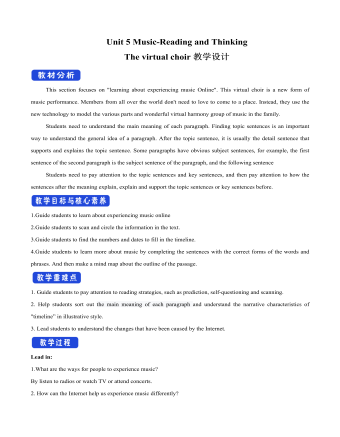
新人教版高中英语必修2Unit 5 Music-Reading and Thinking教案一
This section focuses on "learning about experiencing music Online". This virtual choir is a new form of music performance. Members from all over the world don't need to love to come to a place. Instead, they use the new technology to model the various parts and wonderful virtual harmony group of music in the family. Students need to understand the main meaning of each paragraph. Finding topic sentences is an important way to understand the general idea of a paragraph. After the topic sentence, it is usually the detail sentence that supports and explains the topic sentence. Some paragraphs have obvious subject sentences, for example, the first sentence of the second paragraph is the subject sentence of the paragraph, and the following sentenceStudents need to pay attention to the topic sentences and key sentences, and then pay attention to how the sentences after the meaning explain, explain and support the topic sentences or key sentences before.1.Guide students to learn about experiencing music online2.Guide students to scan and circle the information in the text.3.Guide students to find the numbers and dates to fill in the timeline.4.Guide students to learn more about music by completing the sentences with the correct forms of the words and phrases. And then make a mind map about the outline of the passage.1. Guide students to pay attention to reading strategies, such as prediction, self-questioning and scanning.2. Help students sort out the main meaning of each paragraph and understand the narrative characteristics of "timeline” in illustrative style.3. Lead students to understand the changes that have been caused by the Internet.
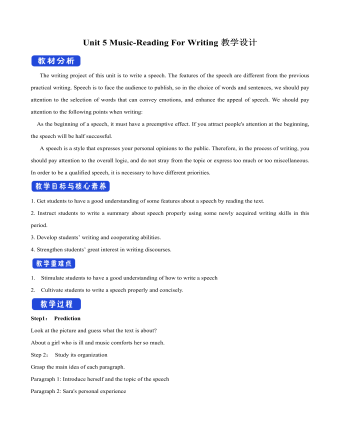
新人教版高中英语必修2Unit 5 Music-Reading For Writing教案一
(4)Now we have heard a number of outstanding speeches ... 我们已经聆听了许多精彩的发言……(5)Because we wanted the nations of the world, working together, to deal with ... 因为我们希望全世界各国团结起来去应对……(6)And if we do not act ... 如果我们不采取行动……(7)Now, I share the concerns that have been expressed ... 我也同意对于……表达的担心(8)Let us show the world that by working together we can ... 让我们告诉全世界,通过一起努力我们可以……(9)It is now time for us to ... 是时候我们……(10)And I have always wished that ... 我一直希望……(11)Thank you for letting me share this day with me.感谢你们和我共度这一天。实践演练:假如你是高中生李华,你校将举办一次以“音乐”为主题的演讲比赛,请你按照主题,写下你的演讲稿。注意:词数100左右。First of all, thank you for listening to my speech. My topic is: love music like love yourself.Music is like the air we need to maintain our normal lives around us. You can't imagine how terrible a world without music would be. Movies and TV shows have no music, only dry conversations and scenes; mobile phones only vibrations; streets only noisy crowds; cafes, western restaurants only depressed meals. What a terrible world it is!As a student, I hope we all can enjoy the fun brought by music in our spare time. Instead of just listening to music, we can even make our own music. Let's enjoy the fun of music!Thanks again for your attention!
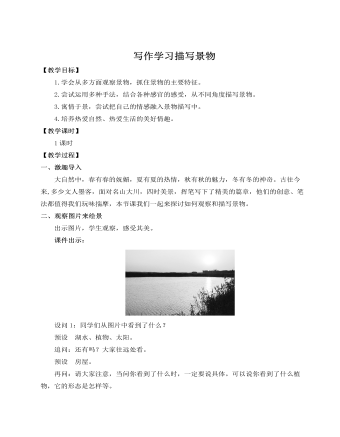
人教部编版语文八年级上册写作学习描写景物教案
原文:我呆呆地坐在窗前,望着窗外天上的月亮……我和妈妈又吵架了,我伤心地哭了。改文:我呆呆地坐在窗前,望着窗外天上的月亮,它升起来了,冰冷地挂在枝头,月色淡白,月影斑驳,月光凄凉地洒向大地……我和妈妈又吵架了,我伤心地哭了。预设 修改后的片段把干瘪无味的语句变得生动形象。选取月亮展开描写,运用“冰冷”“淡白”“斑驳”“凄凉”等冷色调词语来渲染气氛,衬托“我”吵架后沮丧、失落、难过的心情。写作时可以恰当选用词语,运用多种手法写景,以达到渲染氛围的作用。【设计意图】此环节旨在通过升格扩充,让学生小试牛刀,达到学以致用的目的。五、实战演练绘家乡家乡,生我们养我们的地方;家乡,令我们魂牵梦绕的地方;家乡,人生起航的地方。家乡的一草一木、一山一水,必然印在我们的脑海,烙在我们的心上。请你拿起手中的笔,以《家乡一景》为题,描写出这处景物的特征及给你的独特感受,不少于500字。
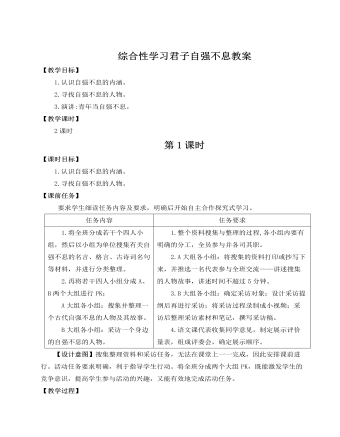
人教部编版语文九年级上册综合性学习君子自强不息教案
正如朱敏先生所说的那样,他之所以能打败那些强大的对手是因为自己的一股韧劲。自强的心鞭策我们勇往直前,失败算什么,困难算什么,自强者永不止步。生命可以大写,也可以小写,还可以简写。小写的生命是灵魂上的侏儒,简写的生命是灵魂上的庸碌者,唯有自强者是天地间用正气、智慧写出的一个气宇轩昂的大写的人。独立是它的一撇,拼搏是它的一捺,两者缺少其一,都不能称之为一个完整意义上的“人”。自强是生命之杯中的琼浆玉液,他让每一个举杯者赢得了鲜花和掌声,收获了成功和喜悦,体味到了人生的真实与厚重!在我们的人生旅程中,每个人或多或少会遇到这样那样的挫折。也许是一次考试的失利,也许是一场突如其来的意外,没有谁能够保证他的一生总是平平安安、一帆风顺。面对挫折我们不应该失意、彷徨,因自己陷入人生灰色的圈子而倍感焦虑、难以自拔。我们要学会自强,因为只有学会自强,我们才敢正视所有问题;只有学会自强,才会有勇气去战胜一道道难题。
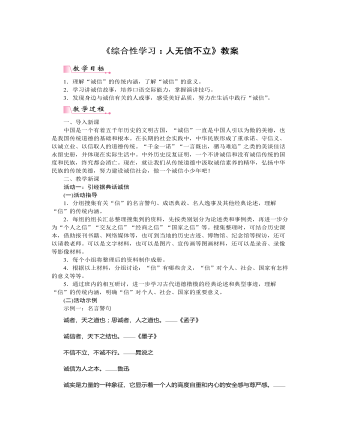
部编版语文八年级上册《综合性学习:人无信不立》教案
(2)比赛过程中演讲者要注意以下几个方面:①表达技巧方面:要观点鲜明,适当使用一些表明个人倾向的词句;要重点突出、层次分明,恰当使用关联词和修辞手法;要与听众沟通、交流,营造气氛;要少用或不用生僻词语、专业术语,多用短句,适当重复。②发音方面:音量适中、自然、有变化,吐字清楚,读音准确,使用重音强调重点,表达感情。③体态语方面:双眼平视前方,与观众进行目光交流;姿势放松,体态自然,做到落落大方、从容自信;根据需要辅以手势,但不宜频繁、夸张。而听众要认真倾听,保持安静。(3)比赛最后,根据评分给参赛者颁奖。
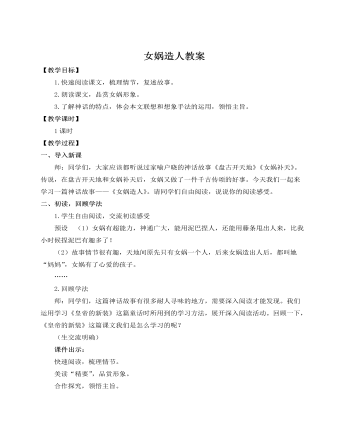
人教部编版七年级语文上册女娲造人教案
【设计亮点】这是一篇自读课文,依据统编教材“教读—自读—课外阅读”的“三位一体”的阅读教学体系的特点和单元整体教学要求,我将本课设计为自读指导课型。我以学生自我阅读实践为主线,设计了四个循序渐进的学生阅读实践活动:初读,激发学生的阅读兴趣,了解学生的阅读认知水平;速读,落实单元能力目标,初步体会神话大胆的想象以及离奇而又合情合理的情节,初步感知女娲的形象;美读,深入品悟女娲形象,进一步体会课文想象奇特而又合情合理的特点;联读,激活学生思维,引导学生深入开展阅读实践活动,深入理解课文中丰富的想象是根植于现实的,而且是合情合理的。通过“四步”阅读,引导学生逐步自求自得,使教读课所学知识、方法和能力得到有效的迁移和拓展。最后,通过布置作业板块将阅读引向课外,实现课内外的有机勾连。【资料链接】袁珂和《中国古代神话》
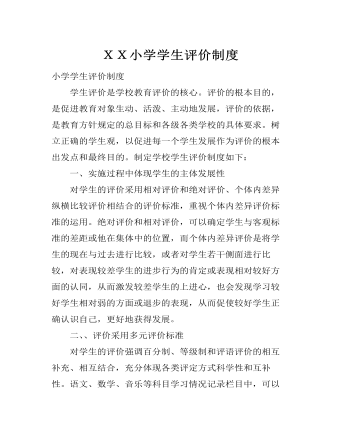
小学学生评价制度
一、实施过程中体现学生的主体发展性 对学生的评价采用相对评价和绝对评价、个体内差异纵横比较评价相结合的评价标准,重视个体内差异评价标准的运用。绝对评价和相对评价,可以确定学生与客观标准的差距或他在集体中的位置,而个体内差异评价是将学生的现在与过去进行比较,或者对学生若干侧面进行比较,对表现较差学生的进步行为的肯定或表现相对较好方面的认同,从而激发较差学生的上进心,也会发现学习较好学生相对弱的方面或退步的表现,从而促使较好学生正确认识自己,更好地获得发展。
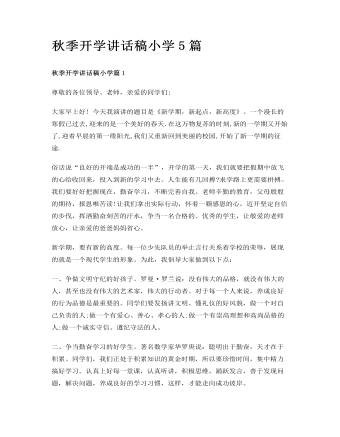
秋季开学讲话稿小学5篇
“民以食为天,食以安为先”,小小餐桌不仅传承了中华民族勤俭节约的优秀文化和传统美德,更承载着人民群众的身体健康和生命安全。为倡导“文明用餐,安全健康”的生活方式,引领“崇俭戒奢、文明守信”新风尚。为此,向全体师生发出倡议:一、倡导传统美德,弘扬文明新风。大力弘扬中华民族的传统美德,积极参与“文明餐桌”行动,“七不”劝导行动。“不乱扔垃圾、不随地吐痰、不乱贴乱画、不高空抛物、不大声喧哗、不扰乱公共秩序、不损害侵占公物”二、倡导勤俭惜福,反对铺张浪费。每位同学要崇尚绿色消费,理性消费,按需装饭,厉行节约,反对浪费,推行“光盘行动”,做到不剩饭、不剩菜。自觉遵守公共道德规范,爱护用餐环境,不在餐饮场所喧哗,注重餐饮礼仪,崇尚文明礼让。

人教版高中语文必修3《劝学》教案2篇
五.研习第一段:1.诵读指导要处理好句中停顿2.请学生对照注释翻译本段重点词句:学不可以已已:停止。青,取之于蓝而青于蓝于:从;比。木直中绳中:zhàng符合,合于。虽有槁暴,不复挺者,揉使之然也有通又,揉通煣,以火烘木,使其弯曲。然:这样。翻译:故木受绳则直,金就砺则利,君子博学而日参省乎己,则知明而行无过矣。所以木材经墨线画过(再用斧锯加工)就直了,金属刀剑拿到磨刀石上(磨过)就锋利了,君子广博地学习并且每天对自己检验反省,就能智慧明达,行为没有过错了。3.本段是从哪个角度论述中心论点的?明确:本段是从学习的意义这个角度论述中心论点的。荀子认为人的知识、道德、才能都不是天生成的,而是后天不断学习获得的,学习的意义十分重大,所以学习不能停止。4.本段中几个比喻句是为了说明什么道理?学生讨论发言,教师明确:
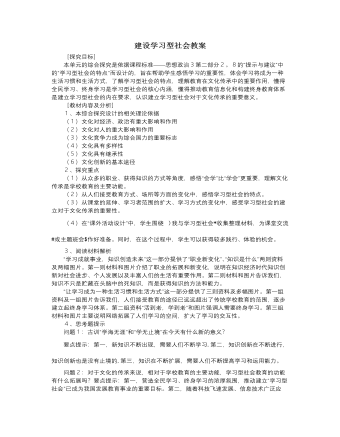
人教版高中政治必修3建设学习型社会教案
三、第三阶段。课后感悟与收获1、让学生以“走向学习型社会”为题,将在收集与整理、展示与交流两个环节中获得的体验和感悟,以心得体会的形式写一篇小论文。2、办一期专栏或黑板报,将优秀小论文作集中展示与交流。(进行理论总结,将实践与理论相结合,让科学理论更好地指导实践。充分挖掘学生潜力,增强学生的自信)[评析]新课程理念之一就是政治课不应只局限于课堂上的教与学。把综合探究课与研究性学习相结合,不失为一种有益的尝试。传统的学习方式把学习建立在客观性、受动性、依赖性的基础上,把学生看成一个没有感情的接受容器,这种学习会窒息学生的思维和智力,成为学生发展的障碍。单元探究活动的开展就是要转变学生的学习方式,关注学生的学习过程,使得探究过程成为学生发现问题、提出问题、分析问题、解决问题的过程,培养学生的创新精神和实践能力。本教案的第一阶段充分发挥了学生的主动性。
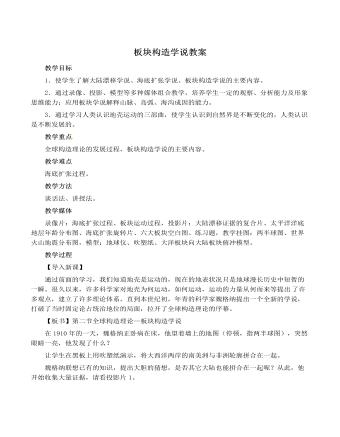
人教版高中地理选修1板块构造学说教案
【启发想象 】能否将刚才讲的内容用一个游泳动作形容一下?这好像蛙泳动作。我们大家一起做:熔岩冒出(双手合十向上)→推向两边(双手向两侧分开)→遇陆俯冲(双手往下)→重熔再生(双手相向合并向上)。【小结板书】二、海底扩张学说前面我们学习了两个假说,整理一下已知条件:事实证明大陆是在漂移的,如欧洲与美洲的距离在扩张,但是漂移的动力不足;海底是不断扩张的,有生长与消亡。能否在前人研究的基础上,提出更准确更合理的假设呢?一个新的理论诞生了,它是目前最盛行、最活跃的全球构造理论【板书】三、板块构造学说1.板块概念学生读书。【启发提问】板块“漂移”与大陆“漂移”的位置有何不同?学生回答。板块漂移是指岩石圈漂在软流层上,大陆漂移发生在地壳两层之间。【提问】板块是如何划分的?读图用半分钟记下六大板块的位置和名称(提示:按大洲和大洋名称记忆)。
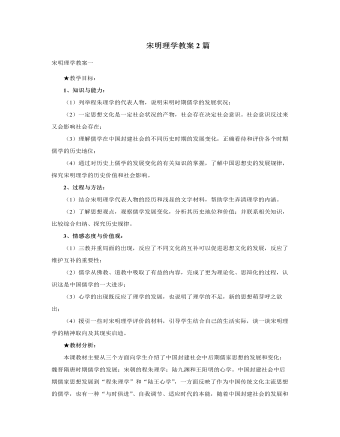
人教版高中历史必修3宋明理学教案2篇
二、程朱理学:1、宋代“理学”的产生:(1)含义:所谓“理学”,就是用“理学”一词来指明当时两宋时期所呈现出来的儒学。广义的理学,泛指以讨论天道问题为中心的整个哲学思潮,包括各种不同的学派;狭义的理学,专指程颢、程颐、朱熹为代表的,以“理”为最高范畴的学说,称为“程朱理学”。理学是北宋政治、社会、经济发展的理论表现,是中国古代哲学长期发展的结果,是批判佛、道学说的产物。他们把“理”或“天理”视作哲学的最高范畴,认为理无所不在,不生不灭,不仅是世界的本原,也是社会生活的最高准则。在穷理方法上,程颢“主静”,强调“正心诚意”;程颐“主敬”,强调“格物致知”。在人性论上,二程主张“去人欲,存天理”,并深入阐释这一观点使之更加系统化。二程学说的出现,标志着宋代“理学”思想体系的正式形成。【合作探究】宋代“理学”兴起的社会条件:
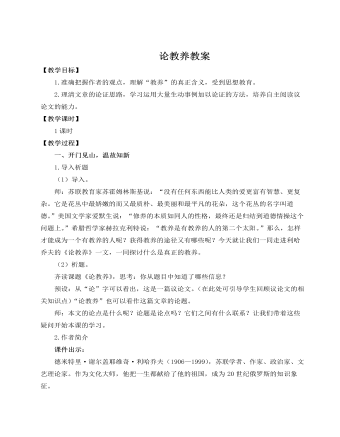
人教部编版语文九年级上册论教养教案
[疑难探究]风度、优雅与教养有怎样的关系?在社会交往中,一个人的谈吐是否得体,举止是否有度,怎样打扮才合适,综合决定一个人是否有风度,这也是教养的具体体现。有些人错误地认为优雅风度就是矫揉造作、忸怩作态和附庸风雅,作者认为这是因为这些人并没有理解风度和优雅的真正内涵——那就是“不应该妨碍他人的生活,要让大家都有良好的自我感觉”,在许多场合要注重礼仪,行为得当,“动作举止、衣装服饰、走路的步态,一切都要有分寸,力求优雅”。优雅的本质是“社会共享的”,而不仅仅是“徒有其表的举止”。作者认为,“敬重社会,珍惜大自然,甚至珍惜动物,珍惜花草树木,珍惜当地的美丽风光,珍惜你居住地的历史,等等”,以敬重的态度对待他人、环境,再加以得体的言行举止和随机应变的智慧,一个人就能够成为有风度而又优雅的人。简而言之,风度和优雅的底色就是教养,是心灵世界真善美的折射。文章就此展开的论述层层推进,解释了风度和优雅源于教养,教养的核心就是敬重、珍惜和爱,做有教养的人应是我们追求的目标。总之,教养修之于内,风度形之于外。





